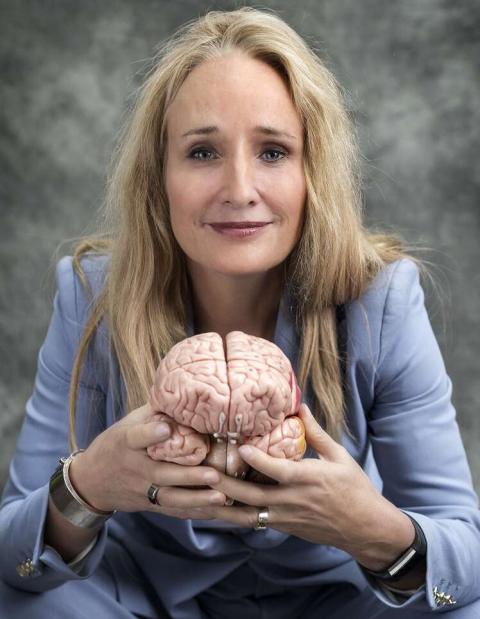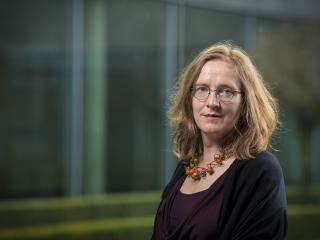Professor Margriet Sitskoorn: "Poverty changes the brain. That scared me"
Dr. Margriet Sitskoorn is Professor of Clinical Neuropsychology at Tilburg University. She is also the Director of its Zero Poverty Lab, that conducts research to help reduce poverty in the Netherlands. Sitskoorn studies the relationship between behavior and the brain. She uses the academic insights provided to address poverty, among other things. “I will be very pleased if there is not one single child in the Netherlands that grows up in poverty.”
Author: Wilfred Hermans
Sitskoorn regularly presents lectures, is active in the media, and has published bestsellers like Het 50+ brein [The 50+ Brain], HersenHack [Brain Hack], and Het maakbare brein [The Mutable Brain]. Anything to bring the relevant knowledge to the attention of a wide audience. “I believe that the evidence-based knowledge we gain should be applied in practice as much as possible, what we refer to as impact, these days. Why people find this subject so interesting? Because people want to understand why they do what they do and want what they want.”
Your existence forms your brain – and vice versa
“I just love knowledge, and discovery is a great motivator for me. I also see that in others. I specialize in the neuroplasticity of the brain, how it constantly adapts to what you feel, do, and experience. That knowledge changed everything for me and it also became the basis of the Zero Poverty Lab. If your brain changes, so do your thoughts, feelings, and actions. If those three change, your behavior changes. If your behavior changes, so does the outside world, if the outside world changes, your brain receives new information, as a result of which your brain changes – and that brings us full circle. Your existence forms your brain, but the reverse is also true. You cannot be everything you want. You are capable of change but, in many situations, you will need support, for instance, in situations of poverty, war, or deep depression.”

As a scientist, can you look the other way when you know there are people in the Netherlands who live in poverty?
How did the subject of poverty cross your path?
“I saw a work of art made by an artist with the help of AI; it showed people in an apocalyptic war zone. Thanks to AI, you could talk to these people. The question that occurred to me personally was: when you have the knowledge of what happens to people in a war situation, do you have a responsibility to use it? I explored and found out that the City of Waalwijk wanted to set up a program to combat poverty. And again the question of responsibility came to my mind: as a scientist, can you look the other way when you know there are people in the Netherlands who live in poverty? This led to a study into the question of what poverty does to the brain – that is my job after all. What I discovered scared me, namely, that the brain changes as a result of poverty. Your stress system changes, making it harder for you to cope with stress; you become better at short-term solutions, because you need that skill, but long-term decision-making becomes harder, as a result of which it is harder to resist impulse buying. Which makes it increasingly difficult to escape from poverty.”
I will be very pleased if there is not one single child in the Netherlands that grows up in poverty
Zero Poverty Lab
The Zero Poverty Lab is at the center of society, Sitskoorn says. “We know that poverty in the Netherlands is rising, that increasingly more children live in poverty, that 400,000 people go to bed hungry every night, and so on. We want to do something about that. The focus is on gaining and disseminating insights among relevant parties, on poverty prevention, and on improving the existing situation. For instance, the Zero Poverty Lab team participates in small-scale projects with family coaches who help people in poverty make the right long-term decisions. They begin by creating the right conditions, such as tidying the house or arranging childcare. On the other hand, we work with enormous databases with relevant information on hundreds of thousands of people, including brain scans. That is how we try to map the most important predictors of the negative impact of poverty. With this evidence-based knowledge, we can contribute to policies in a positive way.”
A lot of money is needed
The lab is working on long-term solutions and that requires a lot of money, Sitskoorn emphasizes. “Eliminating poverty is not something we can do on our own. That is why I do a lot of networking. When I will be satisfied? Not easily, because besides the Netherlands, there are countless countries blighted by poverty. I will be very pleased if there is not one single child in the Netherlands that grows up in poverty. I think there is a good chance that this is possible, otherwise I wouldn’t have started working on this project.”
Support the Zero Poverty Lab – Become a donor
The Zero Poverty Lab is one of Tilburg University's wonderful initiatives supported by the Tilburg University Fund. With your donation to the Tilburg University Fund, you can provide this and other education and research projects with extra support. Together we contribute to a better world.
Date of publication: 20 November 2023



